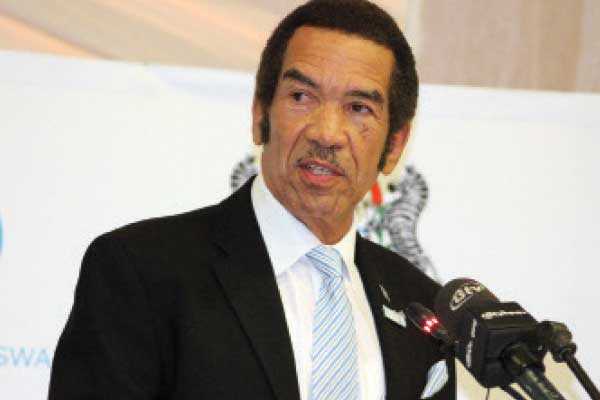Khama reiterates centrality of private sector in economy
President Ian Khama has promised the private sector that his government would create a conducive environment for private sector growth and positive economic growth by maintaining and improving its policies and the regulatory framework.
Officiating at the 14th National Business Conference in Francistown this week Khama said it’s important to realise that the government or private sector alone cannot position Botswana on a high, stable non-inflationary and diversified economic growth. “We have been consistent as government in our view that the private sector has a central role in our pursuit of economic transformation. We firmly believe that the business of producing goods and services through meaningful and productive utilisation of our natural endowments, information and technology, human capital, as well as entrepreneurial capabilities can best be handled by the private sector, hence the true notion that the private sector is the engine of growth for the economy,” he said.He reiterated that government initiated the Economic Diversification Drive (EDD) in 2010 to primarily accelerate economic diversification which had proved to be a challenge since independence.
“EDD emphasises export-led growth while developing productive capacity of enterprises for both domestic and external markets.” The initiative is driven on a Short Term and Medium Term strategy. In the short term, government leverages on its purchasing power through the use of preference margins to promote the production and consumption of locally produced goods and services, explained Khama. He noted that the value of cumulative total purchases since inception in 2010 amounts to P22 billion. Out of this figure, the value of purchases from local manufacturers and service providers is P11 billion. Khama revealed that so far a total of 1 625 enterprises have been registered. These companies have created 44 337 jobs. He said that the Long Term Strategy aims to develop Botswana enterprises to become nationally and globally competitive with little or no government intervention. “The main aim is to diversify the economy into sectors that will continue to grow long after minerals have run out,” said Khama.
He explained that government was also facilitating the use of locally manufactured building and road construction materials by contractors in all Economic Stimulus projects. “To-date, 74 locally-based manufacturers of building and road construction materials have been registered in the Roads, Building and Construction Manufacturer’s Database,” said Khama who added that assessments were currently being undertaken to ascertain their capacity and capabilities to produce the required materials in the right quantities and quality. “These companies offer great potential in our pursuit for employment creation,” he stated.
Khama also revealed that his government will promote effective business regulations and private property rights to ensure that businesses are not hobbled by excessive regulations and red tape. “In this regard, government is implementing a Doing Business Reforms Roadmap and Action Plan with a view to addressing administrative, legal and structural bottlenecks,” said Khama, adding that government has in its quest to modernise the economy and position it as a global competitor, opened up the provision of water and power, as well as delivery of road infrastructure projects to private capital.






